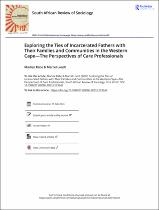| dc.contributor.author | Rabe, Marlize | |
| dc.contributor.author | Londt, Marcel | |
| dc.date.accessioned | 2023-06-23T12:47:04Z | |
| dc.date.available | 2023-06-23T12:47:04Z | |
| dc.date.issued | 2022 | |
| dc.identifier.citation | Rabe, M., & Londt, M. (2022). Exploring the ties of incarcerated fathers with their families and communities in the Western Cape-The perspectives of care professionals. South African Review of Sociology, 52(4), 42–57. https://doi.org/10.1080/21528586.2023.2173643 | en_US |
| dc.identifier.issn | 2072-1978 | |
| dc.identifier.uri | https://doi.org/10.1080/21528586.2023.2173643 | |
| dc.identifier.uri | http://hdl.handle.net/10566/9142 | |
| dc.description.abstract | It is often argued that incarcerated men who stay connected withtheir families are less likely to reoffend. Despite the growingliterature on non-residential fatherhood in South Africa, littleresearch has been conducted on incarcerated men in SouthAfrica. In this article, we draw on the expertise and perspectivesof three research participants who used to work closely, as careprofessionals, with incarcerated men in the Western Cape. Bydrawing on Bronfenbrenner’s human development theory, thejourneys of incarcerated men as fathers are explored here. Thediversity and the nature of offences are important when the linksbetween fathers, their children and other family members areconsidered during their entry, stay and release from correctionalfacilities. | en_US |
| dc.language.iso | en | en_US |
| dc.publisher | Taylor and Francis Group | en_US |
| dc.subject | Bronfenbrenner’s human development theory | en_US |
| dc.subject | Western Cape | en_US |
| dc.subject | Social work | en_US |
| dc.subject | Family studies | en_US |
| dc.subject | Incarceration | en_US |
| dc.title | Exploring the ties of incarcerated fathers with their families and communities in the Western Cape-The perspectives of care professionals | en_US |
| dc.type | Article | en_US |

